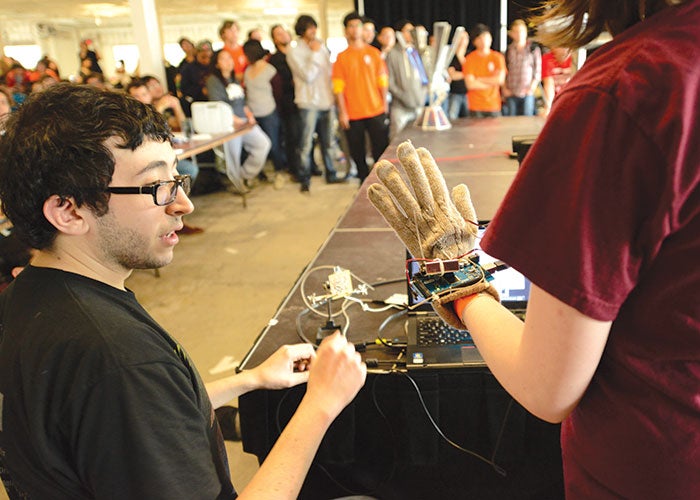Billed as the largest West Coast hackathon, with more than 1,200 programmers attending from 50 universities, HackTECH 2014 took place January 24-26 in Santa Monica, Calif. The venue was the top floor of Santa Monica Place, a high-end mall with a view of the Pier’s Ferris wheel and the Pacific Ocean. Yet for the student programmers, the setting was irrelevant; sunshine played no part in their weekend. Coding, caffeine, and more coding figured prominently.
“We didn’t get much sleep,” said Jazmine Olinger, a junior and one of the four Rensselaer computer science students who (with sophomores Robert Rouhani and Mike Zemsky, and junior Sebastian Sarbora) represented Rensselaer at the event. Their project, ArtPress (github.com/TeamFrenchPress/ArtPress), was one of the event’s finalists.

Rensselaer’s Mike Zemsky and Jazmine Olinger work on their hack, called ArtPress, a virtual combination of music and art.
There is a growing community building around these high-energy weekends, with new hackathons being announced every month. In this context, “hacking” has no negative connotations of cyber-stealing—it just means cranking out code, whether for new ideas or a cause.
PennApps, at PennState, was the first and is still one of the largest student-run events, and MHacks, at the University of Michigan, is a prominent annual event. Rouhani, Olinger, Sarbora, and Zemsky also attended Y-hack (at Yale), and hope to compete at BitCamp (University of Maryland) and HackNY.
For most hackathon events, the fundamentals are the same: students arrive with little more than a toothbrush and an idea, or hack. HackTECH 2014 had the added incentive of providing a small travel stipend, and all meals and snacks. Students then work furiously as a team, coding, problem solving, developing, testing, and—if they are lucky enough to have something in time—presenting, all within 36 hours or less.
There is a growing community building around these high-energy weekends, with new hackathons being announced every month. In this context, “hacking” has no negative connotations of cyber-stealing—it just means cranking out code, whether for new ideas or a cause. The Rensselaer team did transform their idea into reality, and ArtPress was chosen as one of the event’s top 10 projects.”
The Rensselaer team did transform their idea into reality, and ArtPress was chosen as one of the event’s top 10 projects. A hardware/software hack, ArtPress features a Bluetooth- controlled LED wristband, an Infrared Point Glove, and an Infrared detection camera. A virtual combination of music and art, the wristband uses software written in Processing to visualize music based on beat detection. It can also be used in “Paint Brush Mode” as a light-emitting stick to draw the music on live video from a webcam, similar in concept to long exposure light graffiti. There is also a glove with pressure points and infrared technology that, with a camera, allows the user to draw or sculpt a 3-D model of the music with lights.
As finalists, the Rensselaer team presented their project not only to the panel of judges, but to the other 1,200 hackers gathered around the stage. “An amazing experience,” according to Rouhani.
All four students mentioned that their experience with the Rensselaer Center for Open Source Software (RCOS) was instrumental in preparing them for the high-pressure coding, teamwork, problem solving, and, most of all, presentation skills that served them in the event.
“At RCOS, we are always figuring out ways to get around an issue or roadblock, and we get lots of practice coding, and presenting what we’ve done,” Sarbora said. The lessons learned from the experience, according to Rouhani, included one that is universally important among speakers or presenters: “If your demo doesn’t work during a presentation, don’t try to fix it, just keep talking about it.”
David Goldschmidt, a lecturer in computer science and co-director of RCOS, said, “The team’s recent success at HackTECH is one of many examples of RCOS students, on their own initiative, attending hackathons and either placing or winning. To further encourage collaboration and the RCOS mission, Robert and other RCOS students are in the planning and fundraising stages for a multi-university hackathon to be held here at RPI in the fall.”


